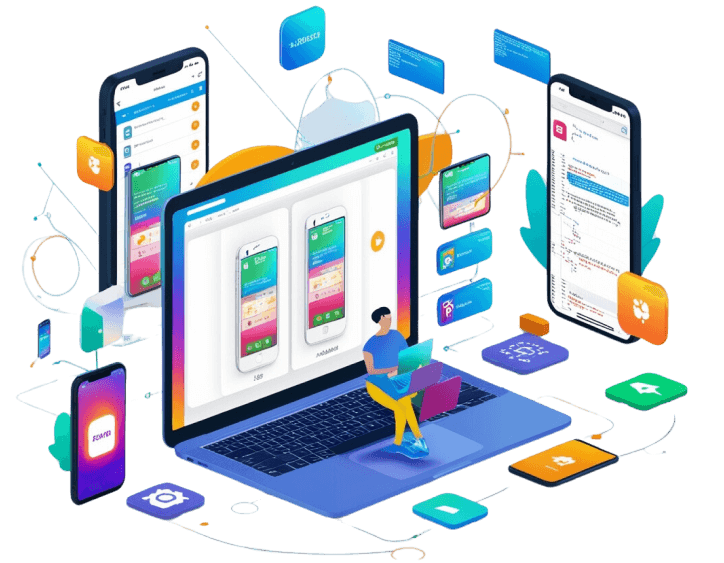Introduction About Cross - Platform Development
Cross-platform development is an approach that allows developers to create applications that run seamlessly on multiple operating systems, such as iOS, Android, and Windows, using a single codebase. This method enhances efficiency, reduces development time, and lowers costs compared to building separate native apps for each platform.

Cross - Platform Development: An Overview for Innovators
Cross-platform development is a modern approach that enables developers to build applications that function seamlessly across multiple operating systems, such as iOS, Android, and Windows, using a single codebase. This methodology eliminates the need for separate native development, reducing time, effort, and costs while ensuring broader market reach.
Innovators and businesses benefit from frameworks like Flutter, React Native, Xamarin, and Unity, which provide tools to create high-quality applications with near-native performance. These frameworks leverage languages such as JavaScript, Dart, and C# to bridge platform-specific differences, enabling developers to write once and deploy across multiple devices.
Key advantages of cross-platform development include faster time-to-market, cost-effectiveness, and consistent user experiences across devices.
Hire the Best Team of Expert Cross - Platform Developers
Finding the right team of expert cross-platform developers is crucial for businesses aiming to build high-quality applications that run seamlessly on multiple operating systems, including iOS, Android, and Web. By leveraging a single codebase, cross-platform development reduces costs, accelerates development time, and ensures a consistent user experience across all devices.
Our team specializes in cutting-edge technologies like Flutter, React Native, Xamarin, and Unity, ensuring that your app is not only feature-rich but also high-performing and scalable. Whether you need a startup MVP or a fully functional enterprise application, we deliver custom solutions tailored to your business goals.
Why Hire Our Expert Cross - Platform Developers?
Choosing the right team for your iPad app development is essential to building a seamless, high-performance application that leverages the full potential of iPadOS. Our expert iPad app developers specialize in crafting intuitive, scalable, and feature-rich apps tailored to your business needs.
- iPadOS Expertise: Proficient in Swift, SwiftUI, and UIKit to build powerful iPad applications.
- Custom UI/UX Design: Optimized for larger screens, Apple Pencil, and multitasking capabilities.
- Performance & Security: Delivering fast, secure, and reliable applications.
- App Store Compliance: Ensuring smooth approval and compliance with Apple’s guidelines.
Cross - Platform Development Tools
Cross-platform development tools enable developers to create applications that run seamlessly on multiple operating systems
using a single codebase. Here are some of the most popular tools:
Flutter (Google)
- Uses Dart programming language.
- Provides a rich UI with customizable widgets for native-like performance.
- Hot reload feature for faster development.
- Supported by Google, ensuring long-term stability.
React Native (Meta/Facebook)
- Uses JavaScript and React to build mobile apps.
- Allows code reusability across iOS and Android.
- Large community and extensive third-party library support.
- Near-native performance with native modules.
Unity
- Best for game development across multiple platforms.
- Supports 2D, 3D, AR, and VR applications.
- Uses C# for scripting.
- Powerful rendering and physics engine.
Xamarin (Microsoft)
- Uses C# and .NET for development.
- Deep integration with Visual Studio and Microsoft ecosystem.
- Code sharing across mobile and desktop platforms.
- Access to native APIs for better performance.
Apache Cordova (PhoneGap)
- Uses HTML, CSS, and JavaScript for hybrid app development.
- Provides plugins for accessing native device features.
- Ideal for simple mobile applications.
Why Choose Us
Hiring a cross-platform developer allows businesses to build high-quality applications that work seamlessly across iOS, Android, and Web with a single codebase. This approach saves time, reduces costs, and ensures a consistent user experience across multiple devices.

A skilled cross-platform developer is proficient in leading frameworks like Flutter, React Native, and Xamarin, ensuring that your app delivers a native-like experience while maintaining consistency across devices. With expertise in modern programming languages such as Dart, JavaScript, and C#, they can efficiently build, test, and deploy applications with minimal redundancy.
- Cost-Effective Development: Reduces expenses by using a single codebase.
- Faster Deployment: Speeds up the app development process.
- Wider Market Reach: Reaches users on multiple platforms.
- Seamless UI/UX Consistency: Ensures a uniform and high-quality experience.
- Easy Maintenance & Updates: Simplifies debugging and feature enhancements.
- Access to Cutting-Edge Technologies: Leverages the latest development tools and frameworks.
Work Process
A work process for an iPad developer typically involves several stages, from planning to deployment and maintenance.
Here’s a structured breakdown of the process

FAQ's
Frequently Asked Questions
Cross-platform development refers to the practice of creating software applications that run on multiple operating systems (such as Android, iOS, Windows, macOS, and Linux) using a single codebase.
Code Reusability: Write once, deploy anywhere.
Cost Efficiency: Reduces development time and costs compared to building separate native apps.
Faster Development: Single codebase means quicker updates and bug fixes.
Wider Market Reach: Supports multiple platforms with a single app.
Yes, frameworks like React Native and Flutter provide bridges to access device features like camera, GPS, and sensors through plugins or native modules.
Native apps typically have better performance, but modern frameworks like Flutter and React Native offer near-native performance, making them suitable for most use cases.
Updates can be rolled out more efficiently as the changes apply to all platforms from a single codebase. However, some OS-specific updates may require additional work.
